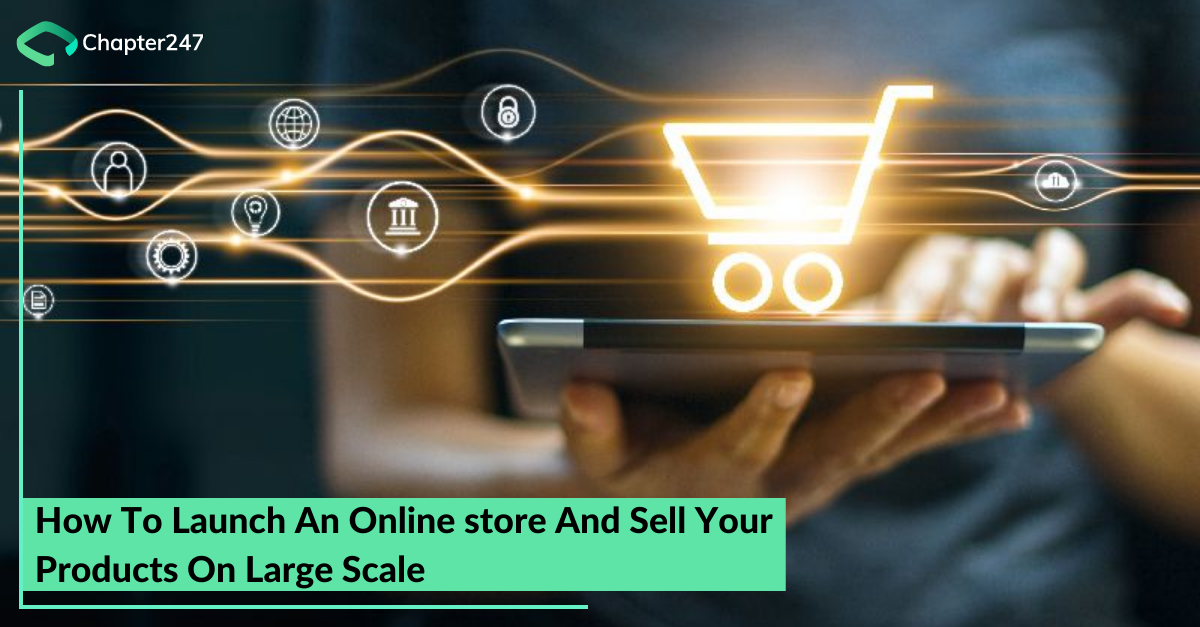Whether you are a proud owner of a brick and mortar store or running a profitable home-based selling business, if you are looking to expand, then venturing in the world of eCommerce is the next big step to achieve success.
In fact, eCommerce sales are expected to make up 17.5% of retail sales worldwide by 2021! But despite this stunning statistic, almost half of such American businesses do not have a web store of their own. This is why now is the perfect time to get down to building one.
The article will focus on providing a holistic guide to building your website from scratch.
The need to have an online store in times like COVID-19
In the wake of social distancing mandates around the world, non-essential brick and mortar retailers are compelled to shut their doors until the measures ease. As a result, E-commerce web application demand is soaring high. A report called ‘Global shopping index’ published by Salesforce, the number of digital shoppers rose 40% year-on-year and these shoppers drove a 20% growth revenue growth now compared to 12% registered in Q1 in 2019. This growth has overtaken the pre-global pandemic 2019 holiday season which is considered the highest revenue generator.
In this article we highlight the necessary points for starting your own website at the earliest. We will cover-
- What to look for in the software firm to build your website.
- 5 key steps taken by Software companies for building an online store.
- Technical requirements to make a great website.
- Business Benefits of online store.
1. What to look for in the software firm to build your website
It is always a great choice to approach a website application development by starting research for it on important platforms like Clutch and Good Firms.
Many companies claim that they are the best and it gets hard to filter them without deep research. We give you 6 key ingredients to make the journey easier.
- The first quality to look for in a software development company is to understand if they provide customized software development services. If the company uses pre-developed themes and does not undertake customized development, it is best to avoid associating with such firms.
- The second point that one must consider is who is the end-user of the software and whether the company can provide the required user experience.
- It is quite important to cross-check with older clients of the software company. If an older client refers you to the company, nothing can be better than that.
- Considering these times, when the need to build the website is faster than normal, it will be important to have detailed interactions with the project development team and understand if they will be able to cater to all your needs.
- Security is a deep-rooted concern especially when it comes to sharing confidential information required for web application development. It is important to choose only that company that guarantees that it will ensure the security of your intellectual property.
- All the firms promise transparent cost structure project development, but ultimately pack it in with several hidden costs. Hence the next parameter is to ensure that the company is transparent with project costing and gives a near accurate picture of the cost involved.
2. 5 key steps taken by Software companies for building an online store
Do you have an option to influence the purchase decisions of customers?
Of course, especially in such times when customers are gathering at online stores to look for their product. A well-designed e-commerce site can influence the purchase decision and this guide will give the exact roadmap to build the online store of your dreams.
Purchasing a domain name:
Your website requires a domain name in order to set up an e-commerce website. The domain name is important as it helps customers find the products online.
Web hosting:
You also will need a hosting provider to make your website live and to send data back and forth from a website every time a customer visits your site.
Considering the best CMS platform:
Select the best CMS platform based on 3 criteria-
Business requirements- It is quite important to understand if your website will be a simple brochure site or an interconnected site with third-party software integration. Based on these priorities, the right CMS platform can be chosen. If you are looking at an easy to use multi-lingual support platform that can garner wider audiences then WordPress is our recommended name.
Security– It is important that a considerable time is devoted to reading up reviews and understanding what other real-users have to tell about their encounters. Security is a key aspect in choosing a CMS which cannot be foregone at any cost.
Mobile-responsive– Most CMS platforms provide features to build responsive devices but by far WordPress is the best CMS system that supports mobile responsive websites. WordPress has great responsive themes to choose from.
Selection of E-commerce platform:
With the choice of many E-commerce platforms, choosing one can be difficult. It is important to have a futuristic perspective of the store while choosing the platform. The platform so chosen should be the one that will create processes for easy scaling.
Building site architecture:
Site architecture is extremely important as it is important to create well-developed site navigation for your e-commerce business. It is critical that product images are displayed well with proper sub-categories mentioned. Some important parts are-
- Product details
- Reviews and testimonials
- Trustmarks
- Payment options
- Website speed
- Selection of the best shipping partner
 3. Technical requirements to make a great website
3. Technical requirements to make a great website
Given below are 5 tech specs that will ensure your website is functional and secure.
Database models:
A database model depicts the logical structure of a database that determines the relationships and constraints determining how data can be stored and accessed. Combining everything, the most crucial part of your eCommerce website is storing and accessing product information. Let’s consider this is with a scenario:
Suppose that you are a retailer who sells women’s western clothing and you want to store information on formal shirts. Some Ecommerce platforms store the data in RDBMS or spreadsheet sort of a format in which the information is kept in tables. The category of shirts can have different aspects like ID, type, color, size, and SKU.
ID | TYPE | COLOR | SIZE | SKU |
| 1 | WOMEN STRIPED COTTON SHIRT | OLIVE | SMALL | 212354 |
Now if this is your only product then all you need to do is add additional rows in the database. But the problem arises when another new entity for instance jeans has to be added. With jeans additional columns like size, pattern, waist size has to be added.
| ID | TYPE | COLOR | SIZE | SKU | WAIST SIZE | TYPE |
| 1 | WOMEN STRIPED COTTON SHIRT | OLIVE | SMALL | 212354 | – | – |
| 2 | WOMEN CRAPE SHIRT | PINK | MEDIUM | 212355 | – | – |
| 3 | WOMEN ROYAL BLUE PUFFED SLEEVE SHIRT | RED | SMALL | 212356 | – | – |
| 4 | WOMEN BLUE JEANS | BLUE | LARGE | 212356 | 36 | SLIM FIT |
This works perfectly fine for a small dataset but it will not be able to scale.
Now imagine a situation where you need to add another 1000 products with different attributes. The above solution will only complicate matters as it will result in the making of thousands of columns. A popular solution to this problem is the Entity-Attribute-Value (EAV) approach followed on all major E-commerce platforms like Woo and magneto. With EAV, product information is stored in multiple tables.
Shopify is again a great option as it uses MySQL as the RDBMS. It is not just durable but also persistent offering a great way to store data and never lose it.
- It is very good for scalability
- It enforces schemas and ACID – atomic, consistent, isolated, and durable transactions. This leads to well-defined behaviours of the query.
- This leads to better configurable performance that is faster lookups, established sync with indices, and better cross-table queries.Woo-commerce offers seamless catalogue management with its catalogue plugins. It is extremely easy to create searchable tables, custom catalogues, and also filter products easily to update prices and descriptions. You can also optimize and reduce the size of the database without losing any functionality.
Security:
Usually, we recommend that the website should have a 256-bit layer transport layer security for end-to-end encryption. As per the current situation, more upgraded standards like TLS 1.2 should be employed so that the data is encrypted from the time a user starts browsing until they leave. HTTPS which is HTTP layered with TLS protection is what is considered the best.
High Performance:
49% of consumers want the page load time to be less than 2 seconds! With the influx of 4G and 5G customers have become impatient and expect faster load speed. Page load speed matters a lot and hence an important KPI for conversions. Even a one-second delay in loading means a 7% loss in conversion!

Source: LoadSource
Our recommended tactics are:
- Instead of utilizing multiple JS or CSS files or making several requests by the browser, it is better to combine it into one individual file allowing the browser to make one overall single request.

Source: KeyCDN
- Caching helps the website become fast. It also helps in achieving a better SEO score leading to greater conversion and user satisfaction.
- Content Delivery Networks (CDN) are the most correct way of delivering content to customers. Its primary role is that it caches the contents on servers which are located in different parts of the world.

Source: Ntt.com
Data Compression:
Several website tools like Gzip are used to compress the data before it is being spent on the browser. It is better to use these tools to make changes in the server configuration files. In return for this, the web server will help by providing files of smaller sizes which will load faster for website users.
Scaling:
It is important to scale when the traffic increases on the website. In the case of flash sales, inventory also has to be prepped up to support the heavy load. Our cloud computing solutions can be extremely helpful to scale your server. We can use our cloud solutions for autoscaling, load balancing, and also as a shared file system to make the online store more scalable.
4. Business Benefits of online store
Some of the most perceptible business benefits are:
- Decreased cost of inventory as inventories can now be managed with automated software
- The cost of setting up an online store is far lesser compared to that of a physical store.
- You are open 24/7 * 365 as the customer can shop anytime leaving you the joy of earning additional revenues
- An online website for your store has become an effective tool for creating brand awareness
- Advertising costs are reduced and costs are incurred on organic search engine traffic, social media traffic, and pay-per-click which are not so substantial.
- Better scope for further growth as businesses can now combine analytics to understand buyer behavior.
Looking for an eCommerce solution?
Chapter247 stands as an end-to-end IT solution provider that has served a vast gamut of business domains for E-commerce. We have been successful in providing secure and multi-functional web application development services using advanced methodologies.
Have a project idea to discuss? Let’s talk









